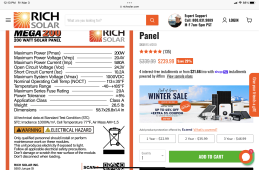@littleharbor2 I’m confused, where am I going sideways?
All good except for one calc. When you add the second string in parallel the current adds but the voltage stays the same.
2s2p = 45.4V, 11.66A x 12 volts = 45 amps. (rounded up)
2s1p = 45.4V, 5.83A
You will need a 45 amp controller for a 12 volt system. If you decide to go 24 volts you can get away with a 25 amp controller.
The numbers I used in post #11 are for the 24 Volt 200 Watt Rich Solar panel (for my 12V batteries wired in series for a 24V system)
Voc = 45.4 Volts
Isp = 5.83 Amps
For 2s1p, there are 2 panels total, the 2s (2 panels in series) adds the voltage of the 2 panels = 90.8 Volts
For 2s1p, the amperage is non-additive therefore stays at 5.83 Amps
So for 2s1p, I end up with 90.8 Volts, 5.83 Amps
For 2s2p, there are 4 panels total, 2 sets of 2 panels in series, so there are 2 series strings in parallel.
The series strings are 90.8 Volts, 5.83 Amps (series adds volts values)
Setting the two series strings in parallel makes 90.8 Volts, 11.66 Amps (parallel adds amp values)
This gives me
2s2p 90.8 Volts, 11.66 Amps
2s1p 90.8 Volts, 5.83 Amps
Thank you,
Mark



